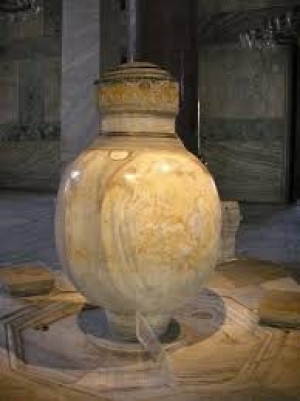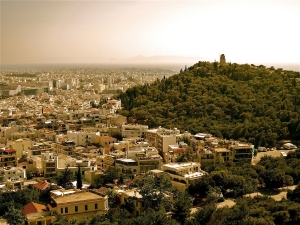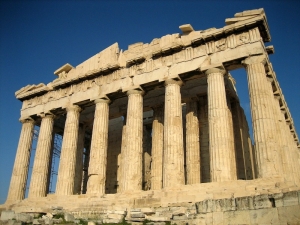LIFE & CULTURE
XpatAthens
Wednesday, 20 January 2016 07:00
Greeks Who Have Left Their Mark On 2015
2015 was a tough year for Greece, but these Greeks managed to distinguish themselves and excel in their professional fields as well as inspire others to continue fighting for their ideals. Here we present to you the 10 Greeks that left their mark in 2015:
Paul Alivisatos
Paul Alivisatos is considered one of the fathers of nanoscience for his ground-breaking research in quantum dots and other artificial nanostructures. In 2015 he was chosen as the recipient of the National Medal of Science by President Obama, America's highest honor for lifetime achievement in fields of scientific research. The Greek-American is the director of the Lawrence Berkeley National Laboratory (Berkeley Lab) and an award-winning chemist. He has been internationally recognized as an authority ont he fabrication of nanocrystals and their use in solar energy applications. Alivisatos, 56, holds appointments with the University of California Berkeley as the Samsung Distinguished Chair in Nanoscience and Nanotechnology. He is also a scientific founder of two prominent nanotechnology companies; Nanosys and Quantum Dot Corp.
John Calamos
Although John Calamos is known as a financial guru and the CEO and Chairman of the Calamos Investments, the Greek-American from Chicago made sure to bring to the U.S. the largest ever Ancient Greek exhibition in 2015. Calamos became the biggest benefactor of the exhibit 'The Greeks: From Agamemnon to Alexander the Great" to the United States. The exhibit, presented at the Field Museum of Chicago in collaboration with the National Hellenic Museum, offers the chance to see up close more than 500 artifacts from Ancient Greece. Calamos is also the biggest donor and Chairman of the National Hellenic Museum in Chicago and countess other organisations that promote Hellenism.
Yannis Behrakis
The Greek photojournalist was praised for his coverage of two of the biggest stories of 2015, Europe's Refugee Crisis and the Financial Implosion in his home country. The Guardian named him its photographer of the year and his photos made it to the covers of some of the world's most important media outlets. Born in 1960, Behrakis studied photography at the Athens School of Arts and Technology and London's Middlesex University. He has covered various significant events such as the Libya Crisis in 1989, the funeral of the founder of Iran's Islamic Republic Ayatollah Ruhollah Khomeini as well as the wars in Croatia, Bosnia and Kosova, Chechyna, Sierra Leone, Somalia and Afghanistan.
Angeliki Pappa
Angeliki Pappa is an eductator that has taught more than 800 students with special educational needs and trained about 1,500 teacher to use her own unique teaching methods. In 2015 she was included in the list of 50 nominees for hte Varkey Foundation's Global Teacher Award for her work on dyslexia for the prize on one million dollars, also widely known as the Nobel Prize of teaching. The top 50 candidates were selected from 8,000 entries and applications submitted from 148 countries around the world. The winner will be announced at the Global Education & Skills Forum, to be held in March 2016 in Dubai.
To read more, please visit: Greek Reporter
Published in
People
Tagged under
Wednesday, 20 January 2016 07:00
Athens Opens Way For First Crematorium In Greece
The City of Athens has made a crucial step in opening the way for the establishment of crematoria in Greece by issuing an invitation for bids for a building to house the first crematorium.
The building must be no smaller than 2,000 square meters and no bigger than 4,000 square meters, and must be located within Athens city limits. Owners wishing to sell or rent their properties to City Hall have to submit their bid by January 24.
The move is made after the law 4277 for a New Regulatory Plan for Athens was passed in the summer of 2014, at the request of Mayor Giorgos Kaminis. Thessaloniki Mayor Yiannis Boutaris had made the same request.
Until summer 2014, cremation facilities were allowed to be built only within cemeteries. However, that was impossible since there is no space whatsoever in the existing cemeteries within the city of Athens.
To read more, please visit: Greek Reporter
To read more, please visit: Greek Reporter
Published in
Local News
Tagged under
Thursday, 14 September 2017 07:00
Free Kids' Playgrounds In Athens
Anyone living in or visiting Athens with young children will find this article very useful! Our friends at Family Goes Out have created an excellent and comprehensive list of free playgrounds around Athens - each one mapped out on Google.
Below are some of the playgrounds included in the list. For a complete guide to public playgrounds and their locations in Athens, please visit: Family Goes Out
Below are some of the playgrounds included in the list. For a complete guide to public playgrounds and their locations in Athens, please visit: Family Goes Out
Playground - Andrea Papandreou Park - Nea Erithrea
Urban park, green with water, ten acres, square with walking lanes, separate playgrounds for younger and older children, skate ramp, cobweb, electronic games, traffic park for cycling.
Playground - Koukaki
Public playground at Kountouriotou Square in Koukaki area. Playground and sports field.
Playground - Caravel
Oumplianis & Diocharous St. Public playground in Ilissia area, near Caravel Hotel. Playground and sports field.
Playground - Galatsi
Public playground located in Attiko Park (Attiko Alsos), in Galatsi. Playground and sports field.
Published in
Kids Life
Tagged under
Monday, 18 January 2016 10:31
School Pizza Bar ~ Best Pizza In Athens
This pizza bar in the centre of Athens has a clever theme, true to its name - School. Seating is available on four separate floors (plus outdoor seating) with a staircase and tables that will surely take you back to your school days.
The menu is rather amusing, with each page offering valuable "lessons". It was quite loud, on account of the Saturday night bustle (also reminiscent of school cafeterias). The only thing that won't remind you of school is the food. School offers the best pizza in Athens, by far! The pizzas are large (8 generous slices), so plan on sharing, especially if you get appetizers. The pizza crust is thin and the amount of cheese is manageable (often not the case with pizza in Greece). We had the Mushroom Pizza (oyster and white mushrooms, smoked Italian pancetta, cherry tomatoes, garlic oil and parsley) which we all agreed was superb.
Appetizers of interest include a very generous charcuterie platter and, what is best described as an alternative take on spanakopita - spinach and cheese mixture wrapped in kadaifi pastry. The dessert selection is nothing out of the ordinary, but Nonna's Cheesecake is promising. The wine selection is average; there are a couple of Italian whites and reds and the rest are Greek wines, all available by the glass or bottle.
Overall, a very positive experience. Can't wait to go again to try another pizza!
Address: Plateia Agias Irinis 8, Athens 105 60
Telephone: 210 32 51 444
Facebook: https://www.facebook.com/SchoolPizzaBar/
By XpatAthens reader: Eleni Philos
The menu is rather amusing, with each page offering valuable "lessons". It was quite loud, on account of the Saturday night bustle (also reminiscent of school cafeterias). The only thing that won't remind you of school is the food. School offers the best pizza in Athens, by far! The pizzas are large (8 generous slices), so plan on sharing, especially if you get appetizers. The pizza crust is thin and the amount of cheese is manageable (often not the case with pizza in Greece). We had the Mushroom Pizza (oyster and white mushrooms, smoked Italian pancetta, cherry tomatoes, garlic oil and parsley) which we all agreed was superb.
Appetizers of interest include a very generous charcuterie platter and, what is best described as an alternative take on spanakopita - spinach and cheese mixture wrapped in kadaifi pastry. The dessert selection is nothing out of the ordinary, but Nonna's Cheesecake is promising. The wine selection is average; there are a couple of Italian whites and reds and the rest are Greek wines, all available by the glass or bottle.
Overall, a very positive experience. Can't wait to go again to try another pizza!
Address: Plateia Agias Irinis 8, Athens 105 60
Telephone: 210 32 51 444
Facebook: https://www.facebook.com/SchoolPizzaBar/
By XpatAthens reader: Eleni Philos
Do you have a review you'd like to share? Get in touch at ideas@xpatathens.com.
Published in
Restaurants In Athens
Tagged under
Thursday, 14 January 2016 11:49
One Of Our Favourite Athens Neighbourhoods Ranks #5 In The World
With wishes of kali xronia, kalo mina, kali evdomada and xronia polla, one might be forgiven for being confused about how exactly to greet people at the start of the year…! But as the Christmas spirit slowly dwindles, and the ‘Winter Sales’ spirit quickly takes over, one’s mind may start to think about all things shiny and new…
Athens seems to be somehow still ‘buzzing’ – it seems to me that there are plenty of tourists around, judging by the number of people wearing tshirts and shorts. Official sources are estimating tourist numbers around 26million visitors for 2015 – this is simply great! Athens is ‘on the map’ more than ever. Even with our well-known challenges and difficulties, people are still coming. Probably in search of a deal - but they came nonetheless... ;)
And now, AirBNB has named one of our favourite Athens neighbourhoods in their Top 10 must-visit up-and-coming global neighbourhoods. KOUKAKI has has taken the #5 spot on this list – sharing the spotlight with neighbourhoods in Japan, Germany, Thailand and France, among others. Here’s what the Daily Mail had to say:
"Adjacent to The Acropolis, Koukaki sits at the bottom of the Lofos Filopappou and, like all great neighborhoods in Greece, is home to many ancient treasures.
In recent years two pedestrian-only streets have cropped up in the neighborhood, Drakou and Olymbou streets, making it a fantastic destination for a wander.
After it became a pedestrian playground, the street morphed to have a cafe-like feel with all of the restaurants and bars placing tables and chairs outside. Grab a coffee, a book, and a seat and watch the parade of people go by.
While you can pop down almost anywhere to grab a drink, O Mpampas has a wide selection of beers, and Vinni Biraria has 66 beers on their menu. For 'creative' Greek cuisine, Edodi is a foodie haven. Ambrosia is popular for traditional Greek fare while Skoumbri specializes in seafood."
Koukaki is also home to Mani Mani, a restaurant inspired by the southern Peloponnese's Mani region, and consistently some of the yummiest food on the block. Fodor’s says that Mani Mani “strikes the perfect balance between sophistication and heartiness. Located in a converted neoclassic residence, the decor has the relaxed precision of an upscale home-decor catalog (a gauzy drape or rag rug here, a beautiful glass vase there), but the food and extensive regional wine list quickly take center stage.” I couldn’t agree more.
And Koukaki is also home to Hitchcocktales, a cool, hidden gem of a bar. This is a beautifully designed space that combines industrial with vintage and modern touches. The menu is international, the music is swing, jazz and lounge, the cocktails are great, and the vibe is happy.
Koukaki is a great place to welcome 2016 and think about all the wonderful ‘what ifs’ of 2016.
Kali xronia!
Until next week,
Jack
Mani Mani
Falirou 10, Athens
+30 210 921 8180
Hitchcocktales
Porinou 10, Athens
+30 210 921 0023
Published in
My Week In Athens
Tagged under
Monday, 18 January 2016 07:00
Greek Cities To Visit: City Breaks Far From Mass Tourism
Although holidays in Greece have mostly been connected with the Greek islands, there are also many nice Greek cities to visit in the mainland. City tourism in Greece is equally enjoyable and will certainly bring unforgettable experiences to the visitor.
Kalambaka: the base to Meteora
The town of Kalambaka, in northern Greece, is a highly developed toursit town blessed with breathtaking natural surroundings. One of the most impressive Greek cities to visit, Kalambaka is actually the base to the wonderful region of Meteora, some gigantic rocky pillars, on top of which stand Byzantine monasteries. Generally Kalambaka is busy year round due to the impressive spots of Meteora.
Monemvasia Old Town
Monemvasia, a Medieval Castle Town that is still inhabited until today, is one of the most romantic destinations in Greece. Take a stroll through charming arched alleyways, Byzantine and Venetian churches, and aristocratic mansions and enjoy breathtaking sea views from the top of the Castle. Outside hte Old Town is the new town of Monemvasia, called Nea Monemvasia. In close distance are beaches that are both organised or secluded.
Ioannina
Visit Ioannina, a beautiful city in the region of Epirus, built around the beautiful lake of Pamvotida, to experience its multicultural environment and rich history. The culture of the city is strongly connected to this lake and promenading at the borders of the lake is a favoritr thing to do there. In Ioannina, visitors can see the Ottoman Mosque of Veli Pasha and the Byzantine Castle.
While in town, do not miss the delicious local liqueurs and sweets, as well as the Museum of Historical Wax Figures Pavlos Vrellis and the Cave of Perama. Due to its geographical position, Ioannina is the perfect base for excursions to the picturesque villages of Zagoria and the archaeological site of Ancient Dodona, where the Sanctuary of Zeus and its ancient oracle are found.
To read this article in full, please visit: Greeka
Published in
Travel Greece
Tagged under
Monday, 18 January 2016 07:00
Cvent: Athens Among Top 25 Meeting Destinations In Europe
London, Barcelona and Paris are the top three cities to hold meetings in Europe, according to event management software firm Cvent, with Athens coming in 19th on the company’s list of the leading 25 destinations for meetings across the continent.
Amsterdam, Berlin, Frankfurt, Madrid, Rome, Brussels and Dublin complete the Top 10, with four cities in the leading 25 in Germany, and two cities each in England, Spain and Italy.
Cvent said it examined meeting planner engagement levels with hotels and venues between July 2014 and June 2015 in 2,500 European cities in its Supplier Network.
“The macro trend we found is that the competition between cities to attract meetings and events is fierce,” says Kevin Fliess, Cvent Vice President of Marketing.
“We are seeing smaller markets investing to lure meetings away from big cities. Two good examples of that would be Manchester and Birmingham in England.”
To read more, please visit: Greek Travel Pages
Published in
Greece In The News
Tagged under
Monday, 18 January 2016 07:00
Generosity On The Ground In Greece
A sea of seperatism between Europe and not-Europe is present in the 6 mile crossing from the Turkish coastline to the closest Greek border on the island of Lesvos. The human flood of refugees fills the channel daily. When weary travelers, soaked by the salty sea, seeking solace and safety, set foot on dry land, they find generosity on the ground in Greece. In the land that invented the notion of hospitality to foreigners, "philoxenia," remains alive and well on the shores of Greece as more than a million asylum seekers have crossed into Europe in 2015. From the islands in the Aegean to the port of Piraeus to the northern border town of Idomeni, taking care of these fragile travelers has been the incentive that has created more than a hundred groups of volunteers, large and small, to soften the harsh journey. While European governments bicker acrimoniously about borders and migration, Greek, weak from teetering on the precipice of economic collapse for more than 6 years, have opened their arms, hearts and homes to men, women and children who can no longer live in their own countries.
Generosity is not an institution that is mandated. It grows from the hearts of the empathetic and the compassionate. Ad hoc groups have sprung up throughout Greece and Europe to assist where governments have failed. Their kindness and chutzpah have put them in the center of the human flood on the ground in Greece, transforming their generosity of spirit into dry clothing, good walking shoes, a warm meal, a back-pack of basic toiletries, warm gloves, on-line and printed guides to help lead asylum seekers to being properly registered and vetted. Who are these extraordinary groups and what are they doing and how can we support them?
Sensitive sould instinctively feel a call to action, What can be done to help? The majority of these groups are requesting monetary donations at the present time and able voluntees. At the present moment, gathering used products-clothing, baby apparatus, etc to be shipped makes no sense. There is certainly not the manpower to sort it or facilities to store it. It is much better to make a financial contribution, giving the volunteer organisations the ability to purchase supplies locally. They infuse the Greek economy and they buy what is actually needed, as it is needed.
And for those who are considering giving of themselves on the front line, a qualified volunteer means several things; having language capabilities, enduring long days of physically demanding work in all kinds of weather, having a useful skill, working effectively as a team member and being self financing.
Listed below are a few of these amazing groups, Non-Governmental Organizations (NGOs), that have banded together to support refugees.
On Lesvos and Kos:
Help for Refugees in Molyvos
Website: http://www.asterias-starfish.org/en/
Facebook page: https://www.facebook.com/HelpForRefugeesInMolyvos/
Founded by Melinda McRostie, the owner of Captain’s Table restaurant in Molyvos, Starfish hands out food and clothing to refugees and helps refugees with logistics at transit camps. Starfish began in 2014 as a collection of local individuals and international volunteers working together to support refugees arriving in Molyvos. Starfish has grown ever since and registered as an NGO in October 2015. Refugees arriving on the island receive a warm welcome, food, water, dry clothes, shelter, information and access to medical support. They also support refugees to access transport to Mytilini where they can access papers for onward travel.
molyvosrefugees@gmail.com
Hellenic Post Office of Kalloni, C/O Starfish Foundation 81107 Kalloni, Lesvos GREECE
Donations: IBAN: GR4001104070000040700115500 BIC: ETHNGRAA ASTERIAS
National bank of Greece Mythymna Makres, Mythymna 81108 Lesvos
Dirty Girls Lesvos
Facebook Page: https://www.facebook.com/dirtygirlslesvos/?fref=ts
When the refugees arrive on Lesvos in unstable, overcrowded boats, they are drenched in sea water. They are given new clothes and their perfectly good, but wet clothes are discarded and have mostly been trashed, therefore adding to the environmental problems of landfill on Lesvos. Dirty Girls of Lesvos collect the clothes with are laundered commercially. They are sorted and distributed so that they can be reused. The project can cost up to €800 per day on laundering the clothes that refugees have to discard when they arrive wet from their dangerous journey from Turkey.
€100 will mean that 150 warm jackets for children can be collected, washed and redistributed to keep 150 children warm as the weather is cold during the day and freezing at night.
€40 will mean that 100 people will have clean, dry socks to exchange for their wet socks.
Agalia in Kaloni
Tel: 210 69 836 01223
Email: mkoagkalia@hotmail.com
On their way to Mytilini port, the refugees can find some help in the town of Kaloni thanks to the NGO AGALIA: rest, food, clothes, transportation and so much love from a small and wonderful team.
Generosity is not an institution that is mandated. It grows from the hearts of the empathetic and the compassionate. Ad hoc groups have sprung up throughout Greece and Europe to assist where governments have failed. Their kindness and chutzpah have put them in the center of the human flood on the ground in Greece, transforming their generosity of spirit into dry clothing, good walking shoes, a warm meal, a back-pack of basic toiletries, warm gloves, on-line and printed guides to help lead asylum seekers to being properly registered and vetted. Who are these extraordinary groups and what are they doing and how can we support them?
Sensitive sould instinctively feel a call to action, What can be done to help? The majority of these groups are requesting monetary donations at the present time and able voluntees. At the present moment, gathering used products-clothing, baby apparatus, etc to be shipped makes no sense. There is certainly not the manpower to sort it or facilities to store it. It is much better to make a financial contribution, giving the volunteer organisations the ability to purchase supplies locally. They infuse the Greek economy and they buy what is actually needed, as it is needed.
And for those who are considering giving of themselves on the front line, a qualified volunteer means several things; having language capabilities, enduring long days of physically demanding work in all kinds of weather, having a useful skill, working effectively as a team member and being self financing.
Listed below are a few of these amazing groups, Non-Governmental Organizations (NGOs), that have banded together to support refugees.
On Lesvos and Kos:
Help for Refugees in Molyvos
Website: http://www.asterias-starfish.org/en/
Facebook page: https://www.facebook.com/HelpForRefugeesInMolyvos/
Founded by Melinda McRostie, the owner of Captain’s Table restaurant in Molyvos, Starfish hands out food and clothing to refugees and helps refugees with logistics at transit camps. Starfish began in 2014 as a collection of local individuals and international volunteers working together to support refugees arriving in Molyvos. Starfish has grown ever since and registered as an NGO in October 2015. Refugees arriving on the island receive a warm welcome, food, water, dry clothes, shelter, information and access to medical support. They also support refugees to access transport to Mytilini where they can access papers for onward travel.
molyvosrefugees@gmail.com
Hellenic Post Office of Kalloni, C/O Starfish Foundation 81107 Kalloni, Lesvos GREECE
Donations: IBAN: GR4001104070000040700115500 BIC: ETHNGRAA ASTERIAS
National bank of Greece Mythymna Makres, Mythymna 81108 Lesvos
Dirty Girls Lesvos
Facebook Page: https://www.facebook.com/dirtygirlslesvos/?fref=ts
When the refugees arrive on Lesvos in unstable, overcrowded boats, they are drenched in sea water. They are given new clothes and their perfectly good, but wet clothes are discarded and have mostly been trashed, therefore adding to the environmental problems of landfill on Lesvos. Dirty Girls of Lesvos collect the clothes with are laundered commercially. They are sorted and distributed so that they can be reused. The project can cost up to €800 per day on laundering the clothes that refugees have to discard when they arrive wet from their dangerous journey from Turkey.
€100 will mean that 150 warm jackets for children can be collected, washed and redistributed to keep 150 children warm as the weather is cold during the day and freezing at night.
€40 will mean that 100 people will have clean, dry socks to exchange for their wet socks.
Agalia in Kaloni
Tel: 210 69 836 01223
Email: mkoagkalia@hotmail.com
On their way to Mytilini port, the refugees can find some help in the town of Kaloni thanks to the NGO AGALIA: rest, food, clothes, transportation and so much love from a small and wonderful team.
NGO Agalia Koloni
Lesvos
GR 81107
O Allos Anthropos (The Other Human) Community Kitchen
Website: http://oallosanthropos.blogspot.gr
Facebook page: https://www.facebook.com/koinonikikouzinamjt
The impetus for O Allos Anthropos, a community kitchen, was an unemployed middle aged marketer, seeing all levels of humanity sorting through the discarded seconds at Athens farmers' markets in an effort to gather food that they could not afford to buy. Kostas Polichronopoulos could no longer watch children fighting for scraps of food in the streets of Athens. Initially food was prepared in homes and distributed for free at the farmers' markets. Vendors donated products. Eventually the food was prepared and eaten communally to combat the shame of receiving a free meal. “We eat together and we live together; lunch with our fellow man on the street.” The volunteer operation branched out beyond Athens and traveled to Lesvos in August to assist with the ever increasing numbers of refugees. The number of meals made daily has gone from 300 to 3000.
Plataion 55 & Paramythias Metaxourgeio
Athens +30 6940 882 355, Mytilini +30 6978 550 168
oallosanthropos@gmail.com
Donations: EUROBANK GR 60026 0294 0000 88020 0608548 EUROBANK SWIFT ERBKGRAA, Kostandinos Chronopoulos
Proactiva Open Arms Lifeguard Beach Safety
Website: http://en.proactivaopenarms.org
Facebook page: http://www.facebook.com/proactivaservice
Proactiva Open Arms, an NGO from Barcelona, is a group of volunteer Spanish lifeguards, dedicated to saving lives in the sea. They came to Lesvos in September to assist the refugees that arrive on the Greek coast. They are also on Chios. They arrived in Lesvos with €15.000 from their own pockets, with no public funding. They began financing rescues for a month. With that budget they assisted in disembarking more than 20 boats per day, carrying 50 people each, including babies, kids and elderly people. In total thousands land on the beaches every day.
Donation: ES53 0182 0262 910201668823 (SWIFT: BBVAESMMXXX)
A Drop In The Ocean
Website: http://drapenihavet.no/en/
The Norwegian volunteer group helps refugees as they arrive, including administering first aid and medical treatment. One of its volunteer nurses delivered a baby on the beach in mid-October. There are also volunteers on the island of Chios and in Athens. A Drop in the Ocean runs its own camp for just-arrived refugees, particularly families with small children, where it provides food, tents and donated clothing.
Donations: Dråpen i havet Account number: 1503 67 54327
BIC/SWIFT: DNBANOKKXXX IBAN: NO3015036754327 DNB Bank ASA
Boat Refugee Foundation
Website: http://bootvluchteling.nl/en/
Facebook: https://www.facebook.com/hulpactiebootvluchtelingen
This Dutch NGO assists refugees as they arrive on land with food, dry clothes and medical care in Lesvos, Leros, Kos and Athens. They provide emergency aid and supplies to boat refugees. They focus on the most vulnerable among them: pregnant women, breastfeeding women and children under age 9. As a foundation they work with UNHCR, Red Cross and local volunteers.
Stichting Bootvluchteling Postbus 214, 3890 AE Zeewolde info@bootvluchteling.
Donations: IBAN-account number: NL97 RBRB 0918 9326 37
Lighthouse Relief Lesvos
Website: http://www.lighthouserelief.org
Facebook: https://www.facebook.com/lighthouserelief/
They met in Skala Sikamineas on the northeastern coast of Lesvos in September 2015. This area suffers the highest influx of refugees per day yet lacks both sufficient infrastructure and financial resources. None of the larger organizations are based here and help is urgently needed. These volunteers decided to start their own initiative. At present they provide hundreds of refugees everyday with emergency aid such as heated shelter, healthcare, clothes, food and water. The main priority is to protect the most vulnerable groups such as children, women and the elderly
info@lighthouserelief.org, medics@lighthouserelief.org, donations@lighthouserelief.org
Donations: Swedish bankgiro: 377-6507
International payments: IBAN SE2950000000054031040237B
Helping Refugees Lesvos Island Skala Sykamineas
Facebook Page:https://www.facebook.com/Helping-refugees-Lesvos-island-Skala-Sykamineas--581610095340512/?fref=ts
In the village of Skala Sykaminea there are several thousands of refugees arriving every day, with a normal population of 300 locals in the summer and 50 in the winter. The village is working hard to help the refugees day and night and at the same time trying to maintain a normal life, which can seem impossible in those conditions. But they do, and still with a smile on their face and love to give. Without any government organizations, they are alone. Recently they have had help from private volunteers and smaller organizations who travel there to offer assistance.
Donations: Skala sykaminea Bank account IBAN : GR5001104150000041563534522 BIC: ETHNGRAA
Lesvos Winter Proof
Facebook Page: http://www.facebook.com/lesvoswinterproof/
Lesvos Winter Proof makes camp Moria in Lesvos ready for winter. Inspired by setting up major outdoor festivals, Lesvos Winter Proof fills the gap in terms of shelter, security, logistics, crowd management and production. It is done working in the event industry and as far as possible in collaboration with other, often small organizations.
lesvos@10000hours.nl
Donations: NL93 RABO 0175271658 t.n.v. Foundation 10.000 HOURS and quoting Lesvos Winter Proof
The Village Of All Together
Facebook Page: https://www.facebook.com/pikpalesvos/
The “Village of All Together” is a network of citizens, collectives, groups and other organizations in Lesbos with a common goal to act altogether. PIKPA is an open, self-organized refugee camp in Lesvos. They distribute food and clothes to the port, Kara Tepe and Moria This self-managed space has hosted more than 6.000 refugees, some for few days and others up to a year. The refugees include asylum and family unification applicants and/or vulnerable groups of newly arrived refugees e.g. people with disabilities, sick, pregnant etc. Food, clothing, medication, legal counsel and medical help as well as are offered.
Donations: ΙΒΑΝ: GR5301107620000076200126290 SWIFT (BIC) ETHNGRAA
Coexistance and Communication In The Aegean
Facebook Page: https://www.facebook.com/groups/514654685298655/
It's the eldest local group for the peaceful coesistence of Turks and Greeks on both sides of the Aegean. The main aim of "Siniparksi", as its name denotes, is the coesistence of different people, with different languages, religions, ethnicity, culture, traditions, ideas. It is basically an antiracist organisation, which deals with refugees and immigrants and with the development of friendly and peaceful relationships with the neighboring people.
Kos Solidarity
Website: https://kos-solidarity.com/
The need for the Kos initiative was sparked by the arrival of refugees in boatloads in late spring of 2015. People were arriving from Bodrum in unseaworthy boats and dinghies in urgent need of food, water, tents, warm clothes and shoes, backpacks and help in establishing their legal status in order to travel safely by ferry to Piraeus. Kos Solidarity works in cooperation with other agencies like UNHCR and MSF etc. All the locals participate on a voluntary basis, daily and most have day jobs. Kos solidarity needs cash donations and volunteers.
info@kos-solidarity.com +30 6946 085 065
Donations: https://www.gofundme.com/
Kos Refugees Need Your Help (KRNYH)
Website: http://kosrefugeesneedyourhelp.com/
Kos has been receiving daily arrivals of people mainly from Syria, Iran, Iraq, Afghanistan and Pakistan, who are in the process of making their way to Central Europe, to seek refuge. Generally, upon arrival in Kos, they begin the registration process (permitting there are no technical delays,) and refugees stay on the island for 3-4 days. Once they receive their registration papers, refugees continue their journey by ferry from the island. With the boat ride to Kos costing thousands of dollars, refugees often arrive with little money, and what they do have must last their entire journey. KRNYH offers daily distribution of hot meals (rice, vegetables, lentils) and bread/milk, provides for rooms for the vulnerable and distributes shoes and backpacks.
kosrefugees@gmail.com, communitykouzina@gmail.com
Donations: Epitopou e.V. IBAN: DE 11370501981932915240 BIC: COLSDE33XXX Sparkasse KölnBonn Address: Hahnenstrasse 57, 50667 Cologne, Germany
On the mainland: Piraeus Port and Athens
Immigrant And Refugee Support Group in Athens
Facebook Page: https://www.facebook.com/groups/204202716585823/
The group aims at providing information about what is going on in Athens and volunteering or offering donations. The volunteers meet at the port of Piraeus to greet the refugees disembarking ships coming in from Samos, Lesvos, Kos and Rhodes to provide them with additional clothing, a back-pack filled with essentials, toiletries and guides before they board buses headed for the next border or head onto camps at Eleona and Ellinikon hosting refugees while they complete the documentation process. Sotiris Alexopoulos is the co-ordinator of Refugees Welcome to Piraeus.
Project Soup Port
Facebook Page: https://www.facebook.com/vereinsoliba/
The Swiss volunteers from Project Soup provide hot tea and soups - prepared and offered on the spot at the entrance of the refugee welcoming station based in E1 passenger terminal in the port of Piraeus. A group of Swiss residents in Greece have organized to bring soup to the port as a part of the meet and greet as travelers disembark the vessels at the port of Piraeus. The organization is devoted to the care of the refugees with the supply and preparation of food. 2or 3 small trucks with a mobile kitchen included go to exhausted refugees to offer a warm meal.
Donation:IBAN: Ch15 0839 0034 0179 1000 6 (note soup-Port)
Bankclearing: 8390 Bic (Swift code): Absoch22
Greek Council For Refugees
Website: http://www.gcr.gr/index.php/en/
The Greek Council for Refugees (GCR) is a Non- Governmental Organization, which has been active since 1989 in the field of asylum and human rights in Greece. On a daily basis, GCR welcomes and offers free legal and social advice and services to refugees and people coming from countries who are entitled to international protection, while special emphasis is put on vulnerable cases, such as unaccompanied minors, victims of trafficking etc. GCR’s Refugee Reception and Interpreters Unit handles the first contact with our beneficiaries since it is consisted of a group of multilingual receptionists, interpreters and political scientists. The interpreters, by conveying the social-historical-cultural features that characterize each case, contribute significantly to the proper function of the Service while they also participate in visits to detention centers, courts and hospitals in order to facilitate GCR beneficiaries’ access to services and good.
gcr1@gcr.gr
25 Solomou Str., 10682, Athens +30 210 3800990-1 F: +30 210 3803774
Donations: National Bank of Greece Account: 116/29606564 IBAN: GR5301101160000011629606564
METAction
Website: http://www.metadrasi.org/eng/
The Non-Governmental Organization “METAction” was founded in December 2009, its primary aim being to promote a rational system for managing mixed migration flows, while encouraging respect for human rights, national and international legislation, through the development of actions for the reception and integration of immigrants and refugees in Greece, as well as of actions of support for their voluntary return and reintegration in their countries of origin.
metadrasi@gmail.com, volunteer.metadrasi@gmail.com
8 Thesprotias, Athens, Greece
+30 210 520 1792, +30 210 5201794
Donations: bank deposit at GR29 0140 1040 1040 0200 2019 320 of Alpha Bank
The Salvation Army In Greece
Website: http://www.salvationarmy.gr
The Salvation Army is an international Christian movement that operates in 124 countries worldwide. In Greece, the Salvation Army has been operating as a nonprofit company from January 2011, standing by the homeless, elderly, young families with infants and victims of trafficking. They are assisting refugees in central Athens as well now.
61Kodrigtonos 10434 Athens
athens@salvationarmy.gr, v.katsantonis@salvationarmy.gr
emily.carlsson@salvationarmy.
Donations: Eurobank IBAN GR0602602520000120200537860 SWIFT CODE: EFGBGRAA
Home For Refugees And Immigrants Notara 26
Website: http://www.notara26.info/blog/?lang=en
This project stands for a self-organized solidarity project, wherein locals and refugees-immigrants decide together. Official “squatting” in an abandon public building in Athens at 26 Notara, volunteers cover the refugees/immigrants immediate needs: shelter, food and medical help. The decisive body is the squat’s open assembly where everyone is welcome to participate with no exclusions.
Notara 26 runs a collective kitchen. Materials contributions are welcome and/or your help in the collective cooking.
+30 6947 908 121 +30 6978 873 643 notara26@riseup.net
Article written by Stacey Harris-Papaioannou
staceymykonos@yahoo.com
Lesvos
GR 81107
O Allos Anthropos (The Other Human) Community Kitchen
Website: http://oallosanthropos.blogspot.gr
Facebook page: https://www.facebook.com/koinonikikouzinamjt
The impetus for O Allos Anthropos, a community kitchen, was an unemployed middle aged marketer, seeing all levels of humanity sorting through the discarded seconds at Athens farmers' markets in an effort to gather food that they could not afford to buy. Kostas Polichronopoulos could no longer watch children fighting for scraps of food in the streets of Athens. Initially food was prepared in homes and distributed for free at the farmers' markets. Vendors donated products. Eventually the food was prepared and eaten communally to combat the shame of receiving a free meal. “We eat together and we live together; lunch with our fellow man on the street.” The volunteer operation branched out beyond Athens and traveled to Lesvos in August to assist with the ever increasing numbers of refugees. The number of meals made daily has gone from 300 to 3000.
Plataion 55 & Paramythias Metaxourgeio
Athens +30 6940 882 355, Mytilini +30 6978 550 168
oallosanthropos@gmail.com
Donations: EUROBANK GR 60026 0294 0000 88020 0608548 EUROBANK SWIFT ERBKGRAA, Kostandinos Chronopoulos
Proactiva Open Arms Lifeguard Beach Safety
Website: http://en.proactivaopenarms.org
Facebook page: http://www.facebook.com/proactivaservice
Proactiva Open Arms, an NGO from Barcelona, is a group of volunteer Spanish lifeguards, dedicated to saving lives in the sea. They came to Lesvos in September to assist the refugees that arrive on the Greek coast. They are also on Chios. They arrived in Lesvos with €15.000 from their own pockets, with no public funding. They began financing rescues for a month. With that budget they assisted in disembarking more than 20 boats per day, carrying 50 people each, including babies, kids and elderly people. In total thousands land on the beaches every day.
Donation: ES53 0182 0262 910201668823 (SWIFT: BBVAESMMXXX)
A Drop In The Ocean
Website: http://drapenihavet.no/en/
The Norwegian volunteer group helps refugees as they arrive, including administering first aid and medical treatment. One of its volunteer nurses delivered a baby on the beach in mid-October. There are also volunteers on the island of Chios and in Athens. A Drop in the Ocean runs its own camp for just-arrived refugees, particularly families with small children, where it provides food, tents and donated clothing.
Donations: Dråpen i havet Account number: 1503 67 54327
BIC/SWIFT: DNBANOKKXXX IBAN: NO3015036754327 DNB Bank ASA
Boat Refugee Foundation
Website: http://bootvluchteling.nl/en/
Facebook: https://www.facebook.com/hulpactiebootvluchtelingen
This Dutch NGO assists refugees as they arrive on land with food, dry clothes and medical care in Lesvos, Leros, Kos and Athens. They provide emergency aid and supplies to boat refugees. They focus on the most vulnerable among them: pregnant women, breastfeeding women and children under age 9. As a foundation they work with UNHCR, Red Cross and local volunteers.
Stichting Bootvluchteling Postbus 214, 3890 AE Zeewolde info@bootvluchteling.
Donations: IBAN-account number: NL97 RBRB 0918 9326 37
Lighthouse Relief Lesvos
Website: http://www.lighthouserelief.org
Facebook: https://www.facebook.com/lighthouserelief/
They met in Skala Sikamineas on the northeastern coast of Lesvos in September 2015. This area suffers the highest influx of refugees per day yet lacks both sufficient infrastructure and financial resources. None of the larger organizations are based here and help is urgently needed. These volunteers decided to start their own initiative. At present they provide hundreds of refugees everyday with emergency aid such as heated shelter, healthcare, clothes, food and water. The main priority is to protect the most vulnerable groups such as children, women and the elderly
info@lighthouserelief.org, medics@lighthouserelief.org, donations@lighthouserelief.org
Donations: Swedish bankgiro: 377-6507
International payments: IBAN SE2950000000054031040237B
Helping Refugees Lesvos Island Skala Sykamineas
Facebook Page:https://www.facebook.com/Helping-refugees-Lesvos-island-Skala-Sykamineas--581610095340512/?fref=ts
In the village of Skala Sykaminea there are several thousands of refugees arriving every day, with a normal population of 300 locals in the summer and 50 in the winter. The village is working hard to help the refugees day and night and at the same time trying to maintain a normal life, which can seem impossible in those conditions. But they do, and still with a smile on their face and love to give. Without any government organizations, they are alone. Recently they have had help from private volunteers and smaller organizations who travel there to offer assistance.
Donations: Skala sykaminea Bank account IBAN : GR5001104150000041563534522 BIC: ETHNGRAA
Lesvos Winter Proof
Facebook Page: http://www.facebook.com/lesvoswinterproof/
Lesvos Winter Proof makes camp Moria in Lesvos ready for winter. Inspired by setting up major outdoor festivals, Lesvos Winter Proof fills the gap in terms of shelter, security, logistics, crowd management and production. It is done working in the event industry and as far as possible in collaboration with other, often small organizations.
lesvos@10000hours.nl
Donations: NL93 RABO 0175271658 t.n.v. Foundation 10.000 HOURS and quoting Lesvos Winter Proof
The Village Of All Together
Facebook Page: https://www.facebook.com/pikpalesvos/
The “Village of All Together” is a network of citizens, collectives, groups and other organizations in Lesbos with a common goal to act altogether. PIKPA is an open, self-organized refugee camp in Lesvos. They distribute food and clothes to the port, Kara Tepe and Moria This self-managed space has hosted more than 6.000 refugees, some for few days and others up to a year. The refugees include asylum and family unification applicants and/or vulnerable groups of newly arrived refugees e.g. people with disabilities, sick, pregnant etc. Food, clothing, medication, legal counsel and medical help as well as are offered.
Donations: ΙΒΑΝ: GR5301107620000076200126290 SWIFT (BIC) ETHNGRAA
Coexistance and Communication In The Aegean
Facebook Page: https://www.facebook.com/groups/514654685298655/
It's the eldest local group for the peaceful coesistence of Turks and Greeks on both sides of the Aegean. The main aim of "Siniparksi", as its name denotes, is the coesistence of different people, with different languages, religions, ethnicity, culture, traditions, ideas. It is basically an antiracist organisation, which deals with refugees and immigrants and with the development of friendly and peaceful relationships with the neighboring people.
Kos Solidarity
Website: https://kos-solidarity.com/
The need for the Kos initiative was sparked by the arrival of refugees in boatloads in late spring of 2015. People were arriving from Bodrum in unseaworthy boats and dinghies in urgent need of food, water, tents, warm clothes and shoes, backpacks and help in establishing their legal status in order to travel safely by ferry to Piraeus. Kos Solidarity works in cooperation with other agencies like UNHCR and MSF etc. All the locals participate on a voluntary basis, daily and most have day jobs. Kos solidarity needs cash donations and volunteers.
info@kos-solidarity.com +30 6946 085 065
Donations: https://www.gofundme.com/
Kos Refugees Need Your Help (KRNYH)
Website: http://kosrefugeesneedyourhelp.com/
Kos has been receiving daily arrivals of people mainly from Syria, Iran, Iraq, Afghanistan and Pakistan, who are in the process of making their way to Central Europe, to seek refuge. Generally, upon arrival in Kos, they begin the registration process (permitting there are no technical delays,) and refugees stay on the island for 3-4 days. Once they receive their registration papers, refugees continue their journey by ferry from the island. With the boat ride to Kos costing thousands of dollars, refugees often arrive with little money, and what they do have must last their entire journey. KRNYH offers daily distribution of hot meals (rice, vegetables, lentils) and bread/milk, provides for rooms for the vulnerable and distributes shoes and backpacks.
kosrefugees@gmail.com, communitykouzina@gmail.com
Donations: Epitopou e.V. IBAN: DE 11370501981932915240 BIC: COLSDE33XXX Sparkasse KölnBonn Address: Hahnenstrasse 57, 50667 Cologne, Germany
On the mainland: Piraeus Port and Athens
Immigrant And Refugee Support Group in Athens
Facebook Page: https://www.facebook.com/groups/204202716585823/
The group aims at providing information about what is going on in Athens and volunteering or offering donations. The volunteers meet at the port of Piraeus to greet the refugees disembarking ships coming in from Samos, Lesvos, Kos and Rhodes to provide them with additional clothing, a back-pack filled with essentials, toiletries and guides before they board buses headed for the next border or head onto camps at Eleona and Ellinikon hosting refugees while they complete the documentation process. Sotiris Alexopoulos is the co-ordinator of Refugees Welcome to Piraeus.
Project Soup Port
Facebook Page: https://www.facebook.com/vereinsoliba/
The Swiss volunteers from Project Soup provide hot tea and soups - prepared and offered on the spot at the entrance of the refugee welcoming station based in E1 passenger terminal in the port of Piraeus. A group of Swiss residents in Greece have organized to bring soup to the port as a part of the meet and greet as travelers disembark the vessels at the port of Piraeus. The organization is devoted to the care of the refugees with the supply and preparation of food. 2or 3 small trucks with a mobile kitchen included go to exhausted refugees to offer a warm meal.
Donation:IBAN: Ch15 0839 0034 0179 1000 6 (note soup-Port)
Bankclearing: 8390 Bic (Swift code): Absoch22
Greek Council For Refugees
Website: http://www.gcr.gr/index.php/en/
The Greek Council for Refugees (GCR) is a Non- Governmental Organization, which has been active since 1989 in the field of asylum and human rights in Greece. On a daily basis, GCR welcomes and offers free legal and social advice and services to refugees and people coming from countries who are entitled to international protection, while special emphasis is put on vulnerable cases, such as unaccompanied minors, victims of trafficking etc. GCR’s Refugee Reception and Interpreters Unit handles the first contact with our beneficiaries since it is consisted of a group of multilingual receptionists, interpreters and political scientists. The interpreters, by conveying the social-historical-cultural features that characterize each case, contribute significantly to the proper function of the Service while they also participate in visits to detention centers, courts and hospitals in order to facilitate GCR beneficiaries’ access to services and good.
gcr1@gcr.gr
25 Solomou Str., 10682, Athens +30 210 3800990-1 F: +30 210 3803774
Donations: National Bank of Greece Account: 116/29606564 IBAN: GR5301101160000011629606564
METAction
Website: http://www.metadrasi.org/eng/
The Non-Governmental Organization “METAction” was founded in December 2009, its primary aim being to promote a rational system for managing mixed migration flows, while encouraging respect for human rights, national and international legislation, through the development of actions for the reception and integration of immigrants and refugees in Greece, as well as of actions of support for their voluntary return and reintegration in their countries of origin.
metadrasi@gmail.com, volunteer.metadrasi@gmail.com
8 Thesprotias, Athens, Greece
+30 210 520 1792, +30 210 5201794
Donations: bank deposit at GR29 0140 1040 1040 0200 2019 320 of Alpha Bank
The Salvation Army In Greece
Website: http://www.salvationarmy.gr
The Salvation Army is an international Christian movement that operates in 124 countries worldwide. In Greece, the Salvation Army has been operating as a nonprofit company from January 2011, standing by the homeless, elderly, young families with infants and victims of trafficking. They are assisting refugees in central Athens as well now.
61Kodrigtonos 10434 Athens
athens@salvationarmy.gr, v.katsantonis@salvationarmy.gr
emily.carlsson@salvationarmy.
Donations: Eurobank IBAN GR0602602520000120200537860 SWIFT CODE: EFGBGRAA
Home For Refugees And Immigrants Notara 26
Website: http://www.notara26.info/blog/?lang=en
This project stands for a self-organized solidarity project, wherein locals and refugees-immigrants decide together. Official “squatting” in an abandon public building in Athens at 26 Notara, volunteers cover the refugees/immigrants immediate needs: shelter, food and medical help. The decisive body is the squat’s open assembly where everyone is welcome to participate with no exclusions.
Notara 26 runs a collective kitchen. Materials contributions are welcome and/or your help in the collective cooking.
+30 6947 908 121 +30 6978 873 643 notara26@riseup.net
Article written by Stacey Harris-Papaioannou
staceymykonos@yahoo.com
Published in
Local News
Tagged under
Wednesday, 06 January 2016 12:53
Qatar Airways Travel Festival - Additional 10% Off For XpatAthens Members
Qatar Airways is delighted to launch the first of its kind TRAVEL FESTIVAL bringing you a selection of dream deals and fabulous packages to more than 150 places.
Enjoy exclusive offers* for flights, hotels and car rentals. We have the right deal for you, whether you want to travel by yourself, with a companion or with a group of family and friends.
Book by 17th January 2016 and save* on Economy and Business Class fares for travel between 19th January and 15th December 2016.
Qatar Airways is pleased to offer all members of XpatAthens an additional discount. Simply enter the promotional code "QRTFGR" when booking your next journey and save up to an additional 10% off your Qatar Airways flights! For more information, please click HERE.
Indicative Fares
Fares to Johannesburg: Starting fares from 350€ Economy and 705€ in Business Class.
Fares to Melbourne: Starting fares from 595€ in Economy Class and 1,100€ in Business Class.
Other destinations in offer: Sydney, Singapore, Dubai, Johannesburg, Maldives and many more…
Travel Validity of Offer: 19 January – 15 December 2016
Indicative Fares
Fares to Johannesburg: Starting fares from 350€ Economy and 705€ in Business Class.
Fares to Melbourne: Starting fares from 595€ in Economy Class and 1,100€ in Business Class.
Other destinations in offer: Sydney, Singapore, Dubai, Johannesburg, Maldives and many more…
Travel Validity of Offer: 19 January – 15 December 2016
* As part of our commitment to offering XpatAthens the best choice when booking, use of QRTFGR promo code will also provide access to details of other fare types / promotional fares that may be available in the market at the time of booking but not valid in the promotion. Please check terms and conditions for full details of each offer.
Published in
International Travel
Tagged under
Tuesday, 23 January 2018 07:00
The Most Popular Experiences In Athens
The Acropolis, Ancient Agora, Plaka, Anafiotika, Monastiraki. The famous 'historical triangle' of Athens is full of surprises!
Whether or not you live in the city or you are making your way to the Greek islands, Athens is a must-see destination. Athens is filled with history and culture making it an unforgettable getaway. If you are visiting the city for the first time, be sure to check out these popular experiences from Discover Greece.
Whether or not you live in the city or you are making your way to the Greek islands, Athens is a must-see destination. Athens is filled with history and culture making it an unforgettable getaway. If you are visiting the city for the first time, be sure to check out these popular experiences from Discover Greece.
The Acropolis - The Sacred Rock of Humanity
Centuries seperate the Sacred Rock of the Acropolis from the city that pulsates at its feet, lively and vibrant. It is the place where it all began - philosophy, democracy, the sciences and the theatre. The cluster of temples, shrines and ruins that visitors will encounter at the Acropolis and the creations of the Golden Age of Pericles (5th century BC), form the cornerstone of European culture. It's not surprising that the Acropolis has been on the UNESCO World Heritage Sites list since 1987.
Anafiotika - An Island Beneath the Acropolis
A microcosm stuck in a previous century is carved into the northeast side of the hill of the Acropolis and looks as if it has been lifted from the Cyclades. Wanderers will get lost in its labyrinthine pathways, exploring the charming homes, past patios and whitewashed streets barely wide enough for two.
Syntagma Square - Where History is Made
Syntagma Square is the central hub of the historic centre. Walking in front of the monument of the Unknown Soldier, built in 1932, visitors can feed the pidgeons and wait patiently for the kilted Evzones to perform the changing of the guard, which happens on the hour. Behind the guards is the imposing Hellenic Parliament building. Built as a palace by the architect Friedrich von Gaertner for the first kings of early Greece who settled here in 1843, it has been home to the Greek Parliament since 1935.
To read this article in full, please visit: Discover Greece
Published in
City Discovery
Tagged under













